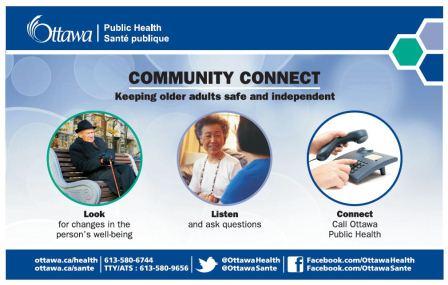Community Connect Program



The proportion of Ottawa’s population aged 65 and older is predicted to increase to 21 per cent by 2031. Although many older adults lead healthy active lives, it is estimated that 10 per cent of older adults are isolated and at an increased risk of losing their independence. In 2013, Ottawa Public Health (OPH), in collaboration with community partners, established the Community Connect program which promotes the awareness and identification of vulnerable older adults and provides telephone information and referral services. The program is based on a gatekeeper model from the United States. It trains non-traditional referral sources (NTRS), who have regular contact with older adults, to identify and link isolated or at-risk older adults for additional support and services. Community Connect also works in partnership with community support services to improve knowledge of services available to vulnerable older adults. The brief training (30 minute session) is offered to City staff as well as employees of businesses and members of community groups. Participants receive pamphlets on local community support services and a training card with risk factors for isolation. Between July 2013 and December 2014, 2,947 people were provided information on isolated, at-risk older adults through the program’s training and outreach activities. Of that, 1,620 were City staff and the remaining were local businesses and community groups. A sample evaluation survey reported 89 percent of participants would likely connect an at-risk older adult. The Community Connect Program received over 150 referrals of adults over the age of 65 since the onset of the program. Of those referrals, the majority of individuals already had a community support service involved. Of the referrals received, only a small percentage was actually referred by trained individuals. Lessons learned of the Community Connect program revolve around how to connect an individual to services. For example having the NTRS offer information first to the identified older adult would reduce duplication and increase informed decision making by the older adult. Referring individuals directly to the local service provider would also reduce duplication of services.
Website: http://ottawa.ca/en/community-connect-training
Main target group: alone
Other target group(s): Isolated and vulnerable older adults
Sector(s): Health
Desired outcome for older people:
Meet their basic needs
Other Issues: Connecting isolated and vulnerable older adults to support supports
Name: Phypers, Susan
Email address: susan.phypers@ottawa.ca
Preferred language(s): English